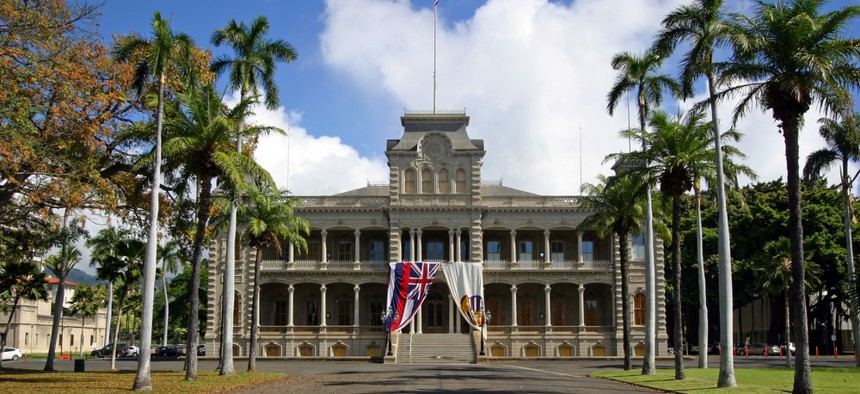As Feds Hold Hearings, Native Hawaiians Press Sovereignty Claims

Iolani Palace in Honolulu is the only royal palace in the United States. Bryan Busovicki/Shutterstock.com
U.S. control of the 50th state is illegal under international law, advocates say.
The issue of Hawaiian sovereignty has been a touchy subject in the Aloha State for decades. But the issue has been especially sensitive this summer as federal officials have traveled the state to discuss the future relationship between the Native Hawaiian community and the United States government, which annexed the formerly independent Hawaiian islands in 1898 following the ousting of Queen Lili’uokalani by American business interests five years earlier.
This June, the U.S. Department of Interior announced that it would hold hearings this summer about possible federal recognition of Native Hawaiians as a tribe which would lead to the eventual formation of a formal government-to-government relationship between the United States and the Native Hawaiian community.
Hawaiian sovereignty advocates say under international law, the United States has been illegally occupying the islands since 1898 and the federal government has exercised unlawful control over Native Hawaiian lands. Federal recognition of Native Hawaiians as a tribe would recognize solidified U.S. control over the islands, sovereignty activists contend.
“The Kingdom of Hawaii was never a tribe,” Francis Moku Malani Jr., a resident of the Big Island, testified during one of the Interior Department hearings last month, according to NBC News . “We are a sovereign nation.”
The hearings touched a nerve in the islands. The “vast majority of native Hawaiians who testified were indignant, and even outraged, that the federal government would try to insert itself or side with any native Hawaiian faction vying to take power away from other Hawaiians by officially organizing and negotiating,” according to the Hawaii Reporter .
What are the legal nuts and bolts of the Hawaiian sovereignty claims?
When you boil it down, the Kingdom of Hawaii was never formally abolished. Under international law, an annexation of a sovereign state must be accomplished through a treaty or an agreement between the two parties. Hawaii’s annexation by the United States was executed through a joint resolution by Congress, which was legally questionable under international law, according to sovereignty supporters.
In an open letter to Esther Kia‘aina , assistant secretary of Insular Affairs at the Department of Interior, published this week on Honolulu Civil Beat , David Keanu Sai, who specializes in Hawaiian constitutionalism and is a founding member of the Hawaii Society of Law and Politics , went into greater legal detail:
In 1988, a legal opinion from the Department of Justice’s Office of Legal Counsel (OLC) could not explain how a joint resolution of Congress could have annexed the Hawaiian Islands in 1898, because congressional laws have no force and effect beyond the borders of the U.S. The OLC cited Congressman Thomas Ball, a Democrat from Texas, who characterized the annexation of Hawaii by joint resolution as “a deliberate attempt to do unlawfully that which can not be lawfully done.”In the Senate, Augustus Bacon, a Democrat from Georgia, stated, “the annexation of foreign territory was necessarily and essentially the subject-matter of a treaty, and that it could not be accomplished legally and constitutionally by a statute or joint resolution.”
This prompted the OLC to conclude, “it is therefore unclear which constitutional power Congress exercised when it acquired Hawaii by joint resolution. Accordingly, it is doubtful that the acquisition of Hawaii can serve as an appropriate precedent for a congressional assertion of sovereignty over an extended territorial sea.”
Therefore, Sai wrote: “Without a treaty, sovereignty remains with the Hawaiian Kingdom, and not the United States, which is why Hawaii has been under an illegal and prolonged occupation since the Spanish-American War in 1898.”
Read Sai’s full open letter on Honolulu Civil Beat .
In 1993, Congress approved a joint resolution that apologized for the overthrow of the Kingdom of Hawaii and supported “reconciliation efforts between the United States and the Native Hawaiian people.” While the resolution didn’t promise reparations for Native Hawaiians, it also didn’t stipulate what the reconciliation would look like.
When they represented Hawaii in the U.S. Senate, Daniel Akaka, now retired, and Daniel Inouye, now deceased, tried to get Congress to pass legislation to obtain federal recognition of Native Hawaiians. But those efforts were ultimately unsuccessful. With the legislative route no longer politically feasible, some supporters of federal recognition say that their only remaining opportunity is through executive action while President Obama, born in Honolulu, is still in office .
According to a July 16 statement released by the pro-sovereignty group MANA , the Movement for Aloha No Ka Aina:
We call on the Department of Interior and the Obama administration to move forward under the principles of democracy, heed the voice of the people of Hawaii and cease any further support for US federal recognition of Native Hawaiians, despite what efforts particular individuals who claim to represent our people may say or pushing to the contrary.
Public comments on the proposed federal recognition of the Native Hawaiian community can be submitted through Aug. 19.
WATCH: University of Hawaii-Manoa Hawaiian Studies Professor Jonathan Osorio discusses Hawaiian sovereignty on Hawaii News Now:
(Photo by Bryan Busovicki / Shutterstock.com )






